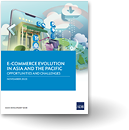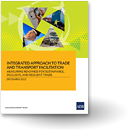Benefits of good governance outweigh the costs
When I was in my late 30s, studying economics in the US, I came across Aid, Policies, and Growth, a journal article published in 2000 in the American Economic Review by Craig Burnside and David Dollar. This seminal paper investigated the growth impact of various economic factors contingent on certain “good” policies.
The empirical finding that foreign aid has a positive impact on economic growth only when the recipient country has a good policy environment was crisp, clear, and appealing to academia and policy makers alike.
Several years ago I was reminded of this paper while working on the country allocation of the Asian Development Fund, ADB’s concessional resources window for less developed member countries. Working in this area really brought home to me just why Burnside and Dollar’s findings had such an impact on donor discussions about aid effectiveness. In fact, they were translated into an actual aid mechanism—a performance-based allocation system of concessional aid resources that was adopted by ADB, the World Bank and other major international development institutions.
Good governance essential to ensure efficient, fair resource allocation
Simply put, a country cannot expect to steer its economic growth and development to improve people’s lives without having quality institutions, a healthy policy environment, and good governance.
It goes without saying that good governance is essential to ensure efficient and fair resource allocation, and that governments should respond to people’s needs through transparent judicial and regulatory environments, as well as democratic processes that are truly participatory.
Good governance is too broad a concept to be covered under a single political system in any country. But the crucial factor underpinning effective governance is where the decision-making authority lies, and how it is exercised. Authority should be accompanied by accountability and responsibility, without which good governance cannot be enshrined into any system.
Good political systems don’t guarantee good governance
In corporations, good governance is about how to better protect shareholders’ rights by addressing the principal-agent problem, including through improving the composition and role of the board. At the country level, though, good governance hinges not only on the legal and regulatory system, but also on how actual interactions and dynamics among relevant stakeholders are framed and unfold as they exercise their authority. Good governance should be supported by a clear commitment to human and moral values, as affirmed in many national constitutions.
Unfortunately, good governance cannot be attained overnight. Usually democracy is a prerequisite, but even a well-established political system does not guarantee good governance. The Republic of Korea is a case in point. The country has made enormous progress on democratization, having gone through a transition from authoritarian to civil government and establishing strong rule of law. But it continues to suffer from criticism that it hasn’t overcome the legacy of crony capitalism. Fixing this problem still looks a tall order.
In many developing countries, lack of transparency results in seemingly legitimate authorities being exercised for personal or vested interests. In addition, unofficial authority sometimes wields undue influence over official political or administrative activities. As a result, it is sometimes difficult to hold people or organizations with official powers accountable, or conversely, authority can be wielded unofficially in ways that don’t carry proper accountabilities. All these factors are symptoms of governance failure.
Transparent systems secure checks & balances that foster accountability
While the legal and regulatory environment is important, even more crucial is whether a country implements transparent systems to secure the checks and balances that foster accountability. Media and civil society can play an important role as independent watchdogs, as long as they have easy access to information.
However advanced a political system may be, good governance cannot take root without ensuring procedural transparency and accountability. Establishing a functioning political system is one thing, but making sure its governance structure works properly is another.
This is the hard part. But history shows us that the returns from achieving it far exceed the costs of bad governance.
Original article was published at the ADB Blog and duplicated here with permission from the author.
Original article was published at the ADB Blog and duplicated here with permission from the author. *





